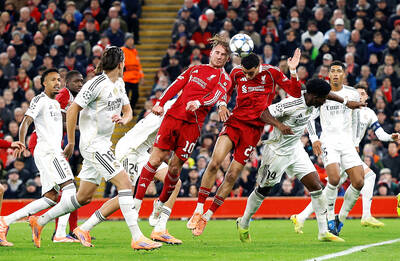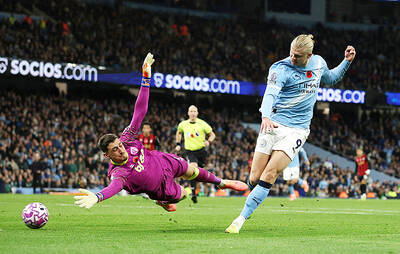One September day in the Yorkshire Dales back in 1967, a handful of female riders set out behind 99 men to compete in a 12-hour time trial organized by Otley Cycling Club.
One of them happened to be Beryl Burton, who many still regard as Britain’s greatest female cyclist, and what transpired throughout that long day helped explode the myth that women lacked the aerobic endurance to challenge men.
Picking off male riders as if she was shelling peas, the relentless 30-year-old clocked up 277.25 miles (446.2km) — not just setting a British women’s record that lasted 50 years, but a men’s one, too.
With two hours remaining, Burton, whose husband, Charlie, spent the day delivering snacks, including a nip of brandy from his support vehicle, caught and passed leading male rider Mike McNamara (who had started two minutes ahead of her).
In one of British sport’s best-loved anecdotes, Beryl Burton is reputed to have glanced across at the struggling McNamara, who incidentally broke the men’s record by completing 276.52 miles, and offered a consolatory Liquorice Allsort.
It was not the first time Beryl Burton, born near Leeds on May 12, 1937, humbled the men.
A year earlier she won the British 100 miles championships in a time that was 38 seconds quicker than the men’s champion from a week earlier on exactly the same course.
In a TV documentary in 1986, one young male rider said: “You only ever see one view of her, and that’s a rear view. She goes by.”
Beryl Burton was introduced to cycling by Charlie Burton, who she married in 1955.
“She was handy, but not that competent, slowly she got better,” he said of her early days on two wheels.
In 1957, she was second in the national 100 miles time trial championships — the first medal in a collection that eventually could have filled a small house.
From the age of 19 to 39 she won 96 national titles, the women’s road world title in 1960 and 1967, and the world individual pursuit track title in 1959, 1960, 1962, 1963 and 1966.
In 1963 she became the first woman to break the hour barrier for the 25 miles time trial.
Beryl Burton won Britain’s best all-rounder time trial competition (25, 50 and 100 miles) 25 years in succession.
Never one to court publicity, the lack of attention paid to women’s cycling at the time still grated.
“It might as well have been the ladies’ darts final down at the local as far as Britain was concerned,” she said after winning the world title in Leipzig, East Germany, in 1960.
Sadly for Beryl Burton, women’s cycling did not enter the Olympics until 1984 and it was another decade before a women’s time trial was included in the world championships.
Who knows how much else the humble housewife from Yorkshire, who never received a penny in sponsorship, would have achieved?
British Cycling president Bob Howden said Beryl Burton’s record of beating men could qualify her as the world’s greatest athlete.
Growing up nearby in Wakefield, he competed against her and said she was the reason he entered the sport.
“I was a spotty 13-year-old and was riding home from football one day and got caught by Beryl coming home, complete with saddlebag and everything,” Howden said. “I instantly recognized her as she was world champion. I couldn’t resist jumping past her, but she just clawed me back and left me. We carried on like that for a few miles and eventually she said: ‘If you think you’re that bloody good join a cycling club.’ And I did. That’s why I am where I am now I guess.”
Beryl Burton’s childhood was beset by ill health and she spent nine months in hospital after a bout of rheumatic fever aged 11. Years spent picking rhubarb in Britain’s so-called “Rhubarb Triangle” helped build her legendary endurance.
Beryl Burton passed on her love of cycling to her daughter, Denise, and they even raced against each other.
Nothing perhaps illustrates her fierce competitiveness than the 1976 national road championships when Denise, then 20, beat her mom, who could not bring herself to congratulate her.
Beryl Burton rode a bike to the end.
On May 5, 1996, while out on her bike delivering invites for her 59th birthday, she suffered a heart attack and died.

ANFIELD BLUES: Kylian Mbappe arrived at Anfield on a run of 21 goals in 17 games, but he managed just three attempts in the match, none of them hitting the target Kylian Mbappe has been nearly unstoppable this season, but he hit a roadblock in their UEFA Champions League match at Anfield on Tuesday. For the second year running, the Real Madrid forward had a night to forget at Merseyside as Liverpool won 1-0. Mbappe looked a shadow of the player who has been tearing defenses apart all season. “We were lacking that threat in the final third,” said Madrid coach Xabi Alonso, without naming Mbappe individually. The FIFA World Cup winner for France rarely looked capable of finding a breakthrough against a Liverpool team who have been so defensively fragile for much of the

LOCAL SUCCESS: In the doubles, Taiwan’s Hsieh Su-wei and Jelena Ostapenko of Latvia defeated Italians Sara Errani and Jasmine Paolini in straight sets Elena Rybakina on Monday punched her ticket to the WTA Finals last four with an impressive 3-6, 6-1, 6-0 victory over second seed Iga Swiatek in round-robin play in Riyadh. After cruising past Amanda Anisimova in her opener on Saturday, Rybakina claimed her second win of the week to guarantee herself top spot in the Serena Williams Group. Anisimova on Monday rallied back from a set and a break down to triumph 4-6, 6-3, 6-2 in her all-American battle with seventh seed Madison Keys, who has been eliminated from the competition. “Madi was playing so well, it was quite a battle out there,”

Erling Haaland on Sunday scored twice to propel Manchester City up to second in the English Premier League with a 3-1 win over AFC Bournemouth. The Cherries started the day in second thanks to the longest unbeaten run in the English top flight, but Andoni Iraola’s side were undone by the scintillating form of the Norwegian striker, who took his tally to 13 Premier League goals in 10 games. Haaland’s relentless streak is maintaining City’s title challenge as they reduced the gap to leaders Arsenal back to six points and edged one point ahead of Liverpool, who they face at the weekend. “Important

Yesterday morning in Japan began with a palpable buzz after the Los Angeles Dodgers announced Shohei Ohtani would start Game 7 of the World Series. By the time countryman Yoshinobu Yamamoto delivered the final out, Tokyo was erupting with joy. “I am so proud today to be Japanese,” said cab driver Seiichiro Okada, who pulled his car to the side of the road to watch the ending. “To be able to watch these legends in real time is something else.” Ohtani had two hits and also pitched, while Yamamoto earned World Series Most Valuable Player after yet another stellar pitching performance as the